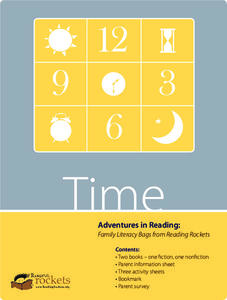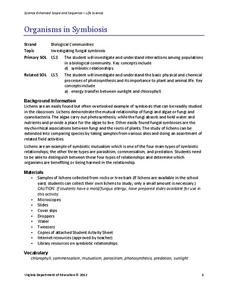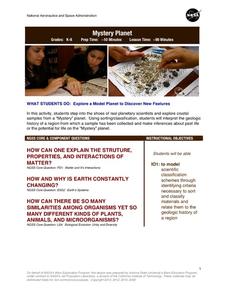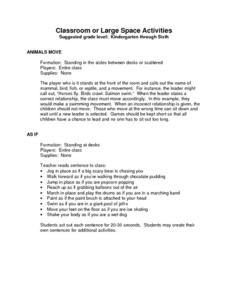Curated OER
Insects?
Can you tell the difference between a bug and an insect? Aren't they the exact same thing? Let your learners explore, identify, classify, and document the differences they see in bugs and insects. The activity sheet suggests several...
McGraw Hill
Arthropods
Are spiders related to crabs? Study the order of arthropods with a reading selection about animal diversity. It provides details about each class within the order, as well as vivid pictures and explanatory charts.
K5 Learning
The Life Cycle
Studying plant, animal, or insect life cycles? Pair a science unit with a reading comprehension learning exercise on life cycles. The passage touches briefly on butterfly, plant, frog, and dog life cycles before prompting readers to...
Re Energy
Build Your Own Biogas Generator
What is biogas and how is it made? After examining background information about the sources of biogas and biogas generators, class members follow the provided information and build a biogas generator that can be used in the classroom.
Earth Day Network
The Neolithic Revolution
With the abundance of food products we can easily access in our society today, it is easy to forget the toll this can take on our global environment. Young learners will discover how the transition to agriculture and domesticated living...
Omaha Zoo
I Like to Move It
What do lemurs do best? They move! Lemurs like to jump, run, hop, and climb and it's your class's job to document seven fun lemur behaviors. The class starts by discussing why lemurs are considered primates, and then they isolate seven...
Virginia Department of Education
Molar Heat of Fusion for Water
How can you describe heat of fusion in a way the class understands and relates the importance of this concept to present day issues? In this third instructional activity of the series, learners conduct an experiment, demonstrating the...
Polar Trec
Arctic Smorgasbord!
Two blooms of phytoplankton, instead of just one, now occur in the Arctic due to declining sea ice, which will have widespread effects on the marine life and climate. In small groups, participants build an Arctic food web with given...
PBS
Reading Adventure Pack: Time
An activity packet explores the concept of time. First, scholars read two stories—The Very Grouchy Ladybug by Eric Carle and Telling Time: How to Tell Time on Digital and Analog Clocks! by Jules Older, illustrated by Megan Halsey....
Teach With Movies
Title: "The Yearling" - Topics: Literature/U.S.; U.S./1865-1913 & Florida
Life in the Florida swamps after the Civil War comes alive in the 1946 film adaptation of Majorie Kinnan Rawlings’s The Yearling. The film of this powerful coming-of-age story, filled with love and loss, can be used with or without a...
Virginia Department of Education
Organisms in Symbiosis
Searching for an activity that allows emerging biologists to explore symbiosis up close and personal? Pupils collect samples and view lichens through a microscope and conclude with a discussion about the relationship they have with other...
K5 Learning
The Merchant's Caravan
Scholars show what they know about a reading passage, The Merchant's Caravan, by way of four short answer questions designed to reinforce reading comprehension skills.
University of Wisconsin
Bimodel Botany Bouquet
Gardeners are given an individual plant specimen from a bouquet of local rain garden plants. They group up by their plant type and then make observations together, name the plant, and introduce it to the rest of the class. You then share...
Redefining Progress
Have and Have-Not
Is there a correlation between a country's wealth and the extent of its ecological footprint? What exactly constitutes an ecological footprint, and how does one country stack up against the rest? This is a unique lesson to incorporate...
School District No. 43
Writing a Greek Myth
Ask your learners to dream up a myth set in modern day. These mythology writing prompts require individuals take on the role of an ancient Greek citizen who just woke up to a totally different world. Through this lens, class members...
NASA
Mystery Planet
What can one learn about a planet based on a small surface sample? Learners will explore artifacts from a mystery planet and see what they can determine about the planet based on the evidence in front of them.
Carolina Biological Supply
Kids, Giraffes, and Neck Bones
Everyone knows giraffes have longer necks than humans, but how do our neck bones compare to theirs? Learners examine a human vertebrae X-ray, counting the bones and predicting how many might be in a giraffe neck. They use a research site...
Scholastic
Owl Moon Teaching Plan
Capture the engagement of young readers with this collection of activities based on Jane Yolen's book, Owl Moon. Following a shared reading of this children's story, the class explores the geography of the American Northeast, creates...
San Joaquin Valley Air Pollution Control District
Classroom or Large Space Activities
The 24 activities detailed in this packet are designed to get kids up and moving with a minimum of chaos. A great resource to have on hand for drama classes and content courses.
Curated OER
The Marvels of Mud
Young scientists roll up their sleeves and get a little dirty in this three-day earth science investigation. Following the scientific method, children monitor the growth of algae in pond water samples in order to determine the role that...
Lampstand Press
Compare/Contrast Worksheet
Walk your class through the process of writing compare and contrast essays with this easy-to-use graphic organizer. After first using the included Venn diagram to record the similarities and differences between two subjects, students...
K12 Reader
Alliteration and Tongue Twisters
Did she sell seashells by the seashore, or did Bill buy berries by the ballpark? Practice literary skills with an activity based on famous tongue twisters. Kids replace the nouns, verb, and adjectives in two phrases to create a new...
It's About Time
The Changing Geography of Your Community
Lead your class in exploring their local communities as well as the general environment. As they determine continental distributions by investigating minerals, rocks, and fossils located in their local region, pupils construct a...
ReadWriteThink
Teaching Point of View With Two Bad Ants
What better way to explain the concept of point of view than from an ant's perspective! After reading Two Bad Ants, pupils identify the point of view of the ants by studying the text and pictures. Then, they fill out a chart that...

























